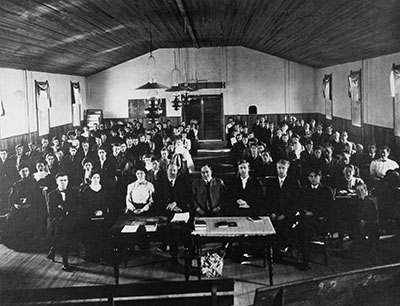OGDEN, Utah – Early members of the Church of Jesus Christ of Latter-day Saints who settled in Utah fostered a culture that emphasized the importance of learning. As part of the Weber Historical Society Lecture series, Mormon history scholar Audrey Godfrey will discuss how circumstances, geography and religious differences raised challenges for early Utah schools. The free, public lecture will be held Feb. 13 at 7 p.m. in Weber State University’s Hurst Center Dumke Legacy Hall.
Weber State alumna Audrey Godfrey has published a variety of work about Mormon history, including her thesis, “A Social History of Camp Floyd, Utah Territory, 1858-

1861” and “By Study and Faith: One Hundred Years of LDS Church Education.”
Godfrey will discuss how instruction from Mormon settlers’ religious leaders included counsel to seek “out of the best books” and encouragement to study. Schools of various kinds taught both children and adults in those early years, but in preparing to evacuate Nauvoo, Illinois, and outlying settlements, limited space in wagons prevented carrying many school supplies. Mormon pioneers’ arrival in Utah’s Great Basin allowed settlers to establish schools again, but challenges abounded and education suffered accordingly.
“Early Utah society was based on self-sufficiency, so its leaders emphasized agricultural production, iron and coal mining, and home industry,” said history professor Gene Sessions. “As a result, education was generally very basic, and one could argue, insufficient, especially in more remote settlements. There were, nevertheless, many early Utahns who worked to provide good schooling for children in the territory. Many heroic teachers worked in far-flung places to establish what were called district schools at the elementary level.”
In the 1870s, Protestant schools arrived in the territory, especially in outlying communities, where well-meaning teachers first met opposition but then acceptance from the Mormon populace. Protestant teachers hoped to help women and children escape polygamy, Sessions said. While the Protestant schools managed to attract a good enrollment of Mormon children, they were unsuccessful in proselytizing Mormon students or their parents.
The influx of Protestant schools challenged Mormon leaders to improve the common schools. Church leaders eventually created many “stake academies” across Utah, including the Weber Stake Academy in 1889, which later became Weber State University.
The Weber Historical Society Lecture Series is sponsored together with the WSU Alumni Association, the College of Social & Behavioral Sciences, the College of Education, WSU’s Department of History and WSU’s Stewart Library. All Weber Historical Society lectures are free and open to all.
Visit weber.edu/wsutoday for more news about Weber State University.
Contact:
Gene Sessions, history professor
801-626-6709 • gsessions1@weber.edu
Author:
Ivonne Dabb, Marketing & Communications
801-626-7439 • ivonnedabb@weber.edu










